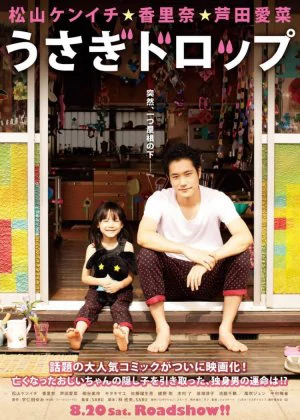Bunny Drop
Even though Hiroyuki Tanaka is a certainty in my selection of favorite directors, for the past few years he has been struggling to find his way (much like the rest of the Japanese film industry). While Bunny Drop [Usagi Drop] isn't a true return to form, it's a damn good film that reaffirms Tanaka's status as an A-grade director. Bunny Drop is a blistering sweet feel-good film that will leave you with a warm and dear smile, what more could you ask for?
![screen capture of Bunny Drop [Usagi Drop]](/thumbs/img/articles/1200xauto/bunny-drop-1.webp)
The Japanese film industry finds itself in a small commercial slump that seems quite difficult to shake off. Many contemporary Japanese dramas and comedies are targeted mainly at the local market, lacking authorship and feeling too slick and derivative of earlier successes. While Bunny Drop isn't completely free from this influence, Tanaka was able to elbow himself into a comfortable enough position to make the film his own.
Bunny Drop is the live-action adaptation of a manga by the same name, but (as is often the case) it was the successful anime adaption that made people take notice in the West. I guess it's important to state that I went in free of any preconceptions. I didn't read the manga, nor did I see the anime prior to this film, so I'm not sure what and if anything was altered for Tanaka's version. As these kinds of things often have a big influence on the overall experience (fans freaking out over changes made to the original story and/or atmosphere), I think it's fair to clear this up before starting the review.
The film follows the story of Rin and Daikichi. Daikichi meets up with Rin at the funeral of his grandfather, where he finds out that Rin is the illegitimate daughter of his late grandpa. Rin's mother is nowhere to be found and the rest of the family doesn't seem to care about the fate of the little girl, so in a bold move, Daikichi decides to take her home with him, claiming legal guardianship. From there on we see how both of them learn to live with each other, which isn't always as fun and exciting as they thought it would be.
![screen capture of Bunny Drop [Usagi Drop]](/thumbs/img/articles/1200xauto/bunny-drop-2.webp)
Visually Tanaka has everything under control. Several well-used filters make for a bright, colorful, and spring-inciting atmosphere that runs through most of the scenes. There are a few moments where Tanaka goes the extra length to create something more (the magazine scenes), though there aren't too many of them. Overall the film has a very pleasant visual style and fans of Tanaka will be pleased to hear he once again included some of his favorable "running scenes", which helped to define his trademark style in his earlier films.
The soundtrack contains some pretty atypical music selections, but if there's anyone who can handle atypical music it's Tanaka. He has a superb feel for rhythm and knows how to make his films benefit from that. There are several scenes (once again the magazine scenes) where it will prove difficult not to tap along with the soundtrack. Then there are some more traditional pieces that will feel very familiar to people watching Japanese drama on a regular basis. The execution is strong and uplifting though, making it a very fresh and light soundtrack, very much in line with the rest of the film.
On paper, the actors would appear to be the weakest link here. Ken'ichi Matsuyama didn't really convince me before and child actors can be very annoying if not cast well. But contrary to my expectations, Tanaka does a great job with the cast. Matsuyama's comic timing may be a little off at times, but his dramatic work is spot on. The real star of the film is Mana Ashida though. She may be just 8 years old, but with acting credits like Bunny Drop and Confssions on her resume, her career couldn't have started any better. She is simply adorable in this film and actually knows to convince in the more dramatic scenes.
![screen capture of Bunny Drop [Usagi Drop]](/thumbs/img/articles/1200xauto/bunny-drop-3.webp)
Bunny Drop is 100% feel-good cinema. If the film doesn't grab you there's a chance you'll find false sentiment all over the place, but Tanaka does everything in his power to avoid this trap. Instead, Bunny Drop becomes a warm and heartfelt drama that makes a few interesting points but never forces them on its audience. There may be one scene near the end of the film that might cause a small fuss, but even that is handled with the proper sense of feel-good, and any ill thoughts are soon forgotten (it is on the other hand quite amusing how quickly we think the worst of some people and situations).
At certain points, you feel that the weight of the manga and anime keep Tanaka from going all out, but the result is still a very fun and imaginative little film that stands proud amongst Tanaka's other films. It's not his greatest film to date, but it beats his previous efforts and gives plenty of hope for the future. If Japanese cinema can lift itself from its minor slump, I'm sure Tanaka can produce another true masterpiece. For now, Bunny Drop is a lovely film with lots to smile about. Wonderfully acted, creatively visualized, aptly scored, and with its heart in the right place, you can't really go wrong with this one.
